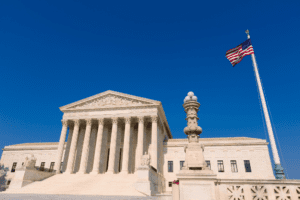 The dissent continued: Like Justice Kavanaugh, I understand the Court’s opinion today to cast no doubt on that aspect of Heller’s holding. Ante, at 3 (concurring opinion). But unlike Justice Kavanaugh, I find the disconnect between Heller’s treatment of laws prohibiting, for example, firearms possession by felons or the mentally ill, and the Court’s treatment of New York’s licensing regime, hard to square. The inconsistency suggests that the Court today takes either an unnecessarily cramped view of the relevant historical record or a needlessly rigid approach to analogical reasoning.
The dissent continued: Like Justice Kavanaugh, I understand the Court’s opinion today to cast no doubt on that aspect of Heller’s holding. Ante, at 3 (concurring opinion). But unlike Justice Kavanaugh, I find the disconnect between Heller’s treatment of laws prohibiting, for example, firearms possession by felons or the mentally ill, and the Court’s treatment of New York’s licensing regime, hard to square. The inconsistency suggests that the Court today takes either an unnecessarily cramped view of the relevant historical record or a needlessly rigid approach to analogical reasoning.
The historical examples of regulations similar to New York’s licensing regime are legion. Closely analogous English laws were enacted beginning in the 13th century, and similar American regulations were passed during the colonial period, the founding era, the 19th century, and the 20th century. Not all of these laws were identical to New York’s, but that is inevitable in an analysis that demands examination of seven centuries of history. At a minimum, the laws I have recounted resembled New York’s law, similarly restricting the right to publicly carry weapons and serving roughly similar purposes.
That is all that the Court’s test, which allows and even encourages “analogical reasoning,” purports to require. See ante, at 21 (disclaiming the necessity of a “historical twin”). In each instance, the Court finds a reason to discount the historical evidence’s persuasive force. Some of the laws New York has identified are too old. But others are too recent. Still others did not last long enough. Some applied to too few people. Some were enacted for the wrong reasons. Some may have been based on a constitutional rationale that is now impossible to identify. Some arose in historically unique circumstances. And some are not sufficiently analogous to the licensing regime at issue here.
Again we see Justice Breyer’s use of adverbs that could signal a deceptive statistic. If the laws recounted “similarly” restrict and serve “roughly” similar purposes, what are the exceptions?
